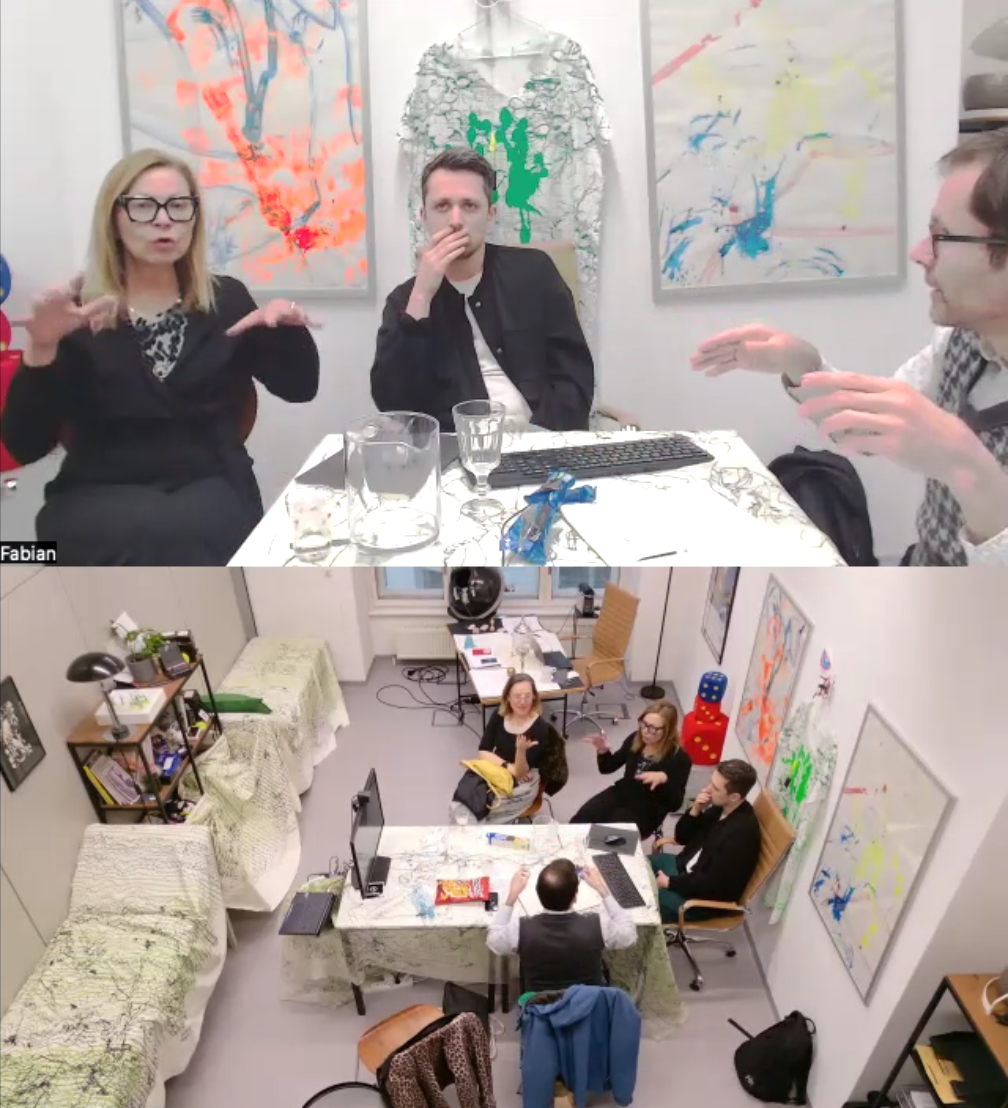ROBOPSY
An Artistic Exploration of Collective Memory through Role-Playing with AI Language Models (ICT23-020) / WWTF Digital Humanities.
Project lead: Margarete Jahrmann with Barbi Markovic and Thomas Brandstetter, Experimental Game Cultures, University of Applied Arts Vienna.
Partners:
Stefan Glasauer, Computational Neuroscience, Brandenburg University of Technology Cottbus-Senftenberg, Germany; Mark Coeckelbergh, Chair Philosophy of Media and Technology, University of Vienna; Robert Trappl, founder of Austrian Research Institute for Artificial Intelligence (OFAI) Vienna.

ROBOPSY: An Artistic Exploration of Collective Memory through Role-Playing with AI Language Models
1. The central question –research topic? why is it important?
In our artistic research project, we address the relationship of Large Language Models (LLM) with collective memory. How do LLMs create meanings and emotions and enact cultural trauma? What are its blind spots, limits, hallucinations? And how does this interaction with LLMs affect the role player’s memory?
2. How do (did) we do it?
main methods of our research briefly and concisely:
To go beyond representing historical facts, participants in our experimental setting interact with LLMs as "robopsychologists" in role-play settings. Our first scenario evolves around the murder of the Austrian philosopher Moritz Schlick in 1936 that resulted in the disintegration of the Vienna Circle.
3. What do we plan to find out and how could this research impact our digital future?
We aim to develop scenarios to provide the framework for the role-playing sessions, which will be conducted in the form of artistic workshops open to the public. The method of role-playing allows the participants to explore how AI collects, curates, and interprets collective memory.
4. What has made this project a “Digital Humanism” project?
Our project provides a space for playful reflection of the cultural and symbolic backgrounds shaping our emotional and epistemic relationship to AI. It brings the critical investigation of LLMs to the public, transforming them into ludic citizen researchers and fostering insight into the "black box" of LLMs.
Abstract
This artistic research project aims at designing and implementing a playful experimental system to creatively examine AI's relationship with collective memory and trauma. By adopting the roles of "robopsychologists," participants interact with AI large language models (LLMs), especially ChatGPT, which will embody historical figures. We will design three scenarios (the experience of adolescents in Belgrade during the Yugoslav Wars, the murder of the Austrian philosopher Moritz Schlick in 1936 that resulted in the disintegration of the Vienna Circle, the terror attack in Vienna in 2020), within which ChatGPT will be prompted to take on the roles of historical personae.
These scenarios provide the frame-work for the role-playing sessions, which will be conducted in the form of artistic workshops open to the public. The method of role-playing allows the participants to explore how AI collects, curates, and interprets collective memory. How do the AI's utterances create meanings and emotions? How do AI models enact cultural trauma? What are its blind spots, limits, hallucinations? And how does this interaction with the AI affect the role players’ memory?
Employing "ludic method" as developed by Margarete Jahrmann allows to complement the research on AI language models done by information scientists, linguists, and media scientists in several ways: 1. It provides a space for the playful reflection of the cultural and symbolic backgrounds shaping our emotional and epistemic relationship to AI. 2. It brings the critical investigation of AI language models to members of the public, transforming them into ludic citizen researchers and thereby fostering insight into the "black box" of LLMs. 3. It investigates the place and meaning of art and artistic practices in an age of rapidly changing technologies that more then ever threaten to transform notions of creativity, ingenuity, and originality.
The project will be a collaboration of artists, game designers, scholars in the field of AI studies and AI ethics and neuroscientists and aims to achieve four outcomes: 1. to gain new knowledge about how LLMs function as algorithmic memory machines, how users interact with the machine and react to the knowledge presented by it, and what it means for our society if AIs are used to curate and access collective memory. This knowledge will be gathered by 2. successfully conducting public play sessions in the form of open experimental systems. To enable people who are not attending the play sessions to participate in the project, we will 3. develop a mobile game/app to role-play with a LLM. Finally and 4., we will disseminate the project and its results through academic (conferences, journal papers) and non-academic (festivals, website, social media) channels.
Contact
Name: Margarete Jahrmann (University of Applied Arts Vienna – Die Angewandte), Thomas Brandstetter (University of Applied Arts Vienna – Die Angewandte), Barbi Markovic (https://barbimarkovic.com)
Contact details: margarete.jahrmann@uni-ak.ac.at
